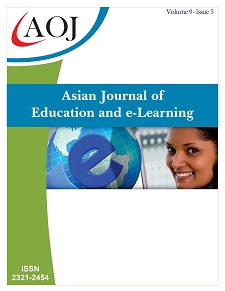Exploring selected factors that determine graduation times in an undergraduate programme
DOI:
https://doi.org/10.24203/ajeel.v9i5.6778Keywords:
predictors, graduation, grade point averageAbstract
Introduction: Timely graduation is of colossal importance to students, universities, and other stakeholders. The purpose of this retrospective study was to examine the time taken to graduate and to determine if pre-enrolment demographic and experiential characteristics of students are predictive of the aggregate grade point average. The secondary purpose of the study was to identify individual aspects between cohorts based on the time taken to complete the course.
Method: The sample for this study included all students enrolled in the Bachelor of Health Science (Oral Health) program at the Auckland University of Technology from 2008 to 2016. The desensitized data were subjected to descriptive and inferential statistical analysis.
Results: The mean grade point average in the first year was lowest in the cohort that took five years to complete and highest in the cohort that took three years to complete. Each year’s grade point average was positively correlated to the next year’s grade point average. The level of prior education and work experience were predictive of the aggregate grade point average in those completing in three years (P<0.05) but not in those completing in four years (P>0.05).
Conclusion: Pre-enrollment factors, level of prior education and work experience were predictive of aggregate grade point average in the cohort completing in three years but not in the cohort completing in four years.
References
Tentsho, K., McNeil, N., & Tongkumchum, P. (2019). Examining timely graduation rates of undergraduate students. Journal of Applied Research in Higher Education, 11(2), 199-209. doi: 10.1108/JARHE-10-2017-0124
Crisp, G., Doran, E., & Salis Reyes, N. A. (2018). Predicting Graduation Rates at 4-Year Broad Access Institutions Using a Bayesian Modeling Approach. Research in Higher Education, 59(2), 133-155.
Oztekin, A. (2016). A hybrid data analytic approach to predict college graduation status and its determinative factors. Industrial Management & Data Systems, 116(8), 1678.
Yue, H., & Fu, X. (2017). Rethinking Graduation and Time to Degree: A Fresh Perspective. Research in Higher Education, 58(2), 184-213.
Su, X., Chen, M., Yur-Austin, J., & Liu, Y. (2020). Restructuring degree roadmaps to improve timely graduation in higher education. International Journal of Educational Management, 34(2), 432.
Green, B. N., Johnson, C. D., & McCarthy, K. (2003). Predicting academic success in the first year of chiropractic college. Journal of Manipulative and Physiological Therapeutics, 26(1), 40-46. doi: 10.1067/mmt.2003.9
Shehmar, M., Haldane, T., Price-Forbes, A., Macdougall, C., Fraser, I., Peterson, S., & Peile, E. (2010). Comparing the performance of graduate-entry and school-leaver medical students: Comparison of graduate-entry and school-leaver students. Medical Education, 44(7), 699-705. doi: 10.1111/j.1365-2923.2010.03685.x
Harth, S. C., Biggs, J. S., & Thong, Y. H. (1990). Mature-age entrants to medical school: a controlled study of sociodemographic characteristics, career choice and job satisfaction. Medical Education, 24(6), 488-498.
Koh, M. Y., & Koh, H. C. (1999). The determinants of performance in an accountancy degree programme. Accounting Education, 8(1), 13-29. doi: 10.1080/096392899331017
Bartlett, S., Peel, M. J., & Pendlebury, M. (1993). From fresher to finalist1. Accounting Education, 2(2), 111-122. doi: 10.1080/09639289300000013
Tumen, S., Shulruf, B., & Hattie, J. (2008). Student Pathways at the University: Patterns and Predictors of Completion. Studies in Higher Education, 33(3), 233-252.
Tickell, G., & Smyrnios, K. X. (2005). Predictors of Tertiary Accounting Students' Academic Performance: A comparison of Year 12-to-university students with TAFE-to-university students. Journal of Higher Education Policy & Management, 27(2), 239-259. https://doi.org/10.1080/13600800500120142
Mercer, A., Abbott, P. V., & Puddey, I. B. (2013). Relationship of selection criteria to subsequent academic performance in an Australian undergraduate dental school. European Journal of Dental Education, 17(1), 39-45. doi: 10.1111/eje.12005
Downloads
Published
How to Cite
Issue
Section
License
Copyright (c) 2021 Manorika Ratnaweera, Rohini Khareedi

This work is licensed under a Creative Commons Attribution-NonCommercial 4.0 International License.
- Papers must be submitted on the understanding that they have not been published elsewhere (except in the form of an abstract or as part of a published lecture, review, or thesis) and are not currently under consideration by another journal published by any other publisher.
- It is also the authors responsibility to ensure that the articles emanating from a particular source are submitted with the necessary approval.
- The authors warrant that the paper is original and that he/she is the author of the paper, except for material that is clearly identified as to its original source, with permission notices from the copyright owners where required.
- The authors ensure that all the references carefully and they are accurate in the text as well as in the list of references (and vice versa).
- Authors retain copyright and grant the journal right of first publication with the work simultaneously licensed under a Attribution-NonCommercial 4.0 International that allows others to share the work with an acknowledgement of the work's authorship and initial publication in this journal.
- Authors are able to enter into separate, additional contractual arrangements for the non-exclusive distribution of the journal's published version of the work (e.g., post it to an institutional repository or publish it in a book), with an acknowledgement of its initial publication in this journal.
- Authors are permitted and encouraged to post their work online (e.g., in institutional repositories or on their website) prior to and during the submission process, as it can lead to productive exchanges, as well as earlier and greater citation of published work (See The Effect of Open Access).
- The journal/publisher is not responsible for subsequent uses of the work. It is the author's responsibility to bring an infringement action if so desired by the author.

